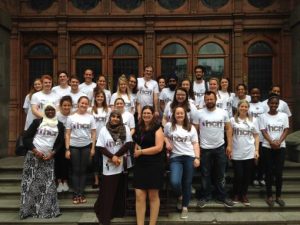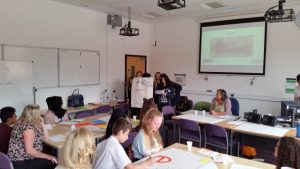Young People in Humanitarianism – engaging our local communities
by Jessica R. Hawkins @hawkinsjessicaR
Aside from our research visit to East Africa, the 2015-16 Masters cohort had an active second semester. In particular, the HCR students of my Humanitarian Case Studies module organised the inaugural Young People in Humanitarianism Conference. This has to be one of the best moments of the academic year. The conference, for which students are assessed through their participation, organisation and reflection, is funded by the Schools University Partnership Initiative. In the lectures for the module, students learnt about different approaches, past and present to tackling specific humanitarian crises, this included lectures from Rony Brauman, former head of MSF and speakers from Save the Children and Syria Relief. In addition, the students participated in a class from an actual secondary school teacher who gave them valuable skills on how to teach young people about humanitarianism.
In today’s world, teenagers are often perceived to be disinterested in the plight of others and are more focused on how many likes their selfie on Instagram can get. If nothing else, the conference demonstrated how active, compassionate and aware young people are of the wider world and were eager to learn about others less fortunate than themselves. We achieved this by holding a one day conference at the University, inviting pupils from nine different secondary schools in the Greater Manchester region, ranging from 12 to 15 years old. Our HCR students were tasked with not only the logistics of organising a conference for 150 people, but were also responsible for preparing the activities along three streams: refugees, disasters and medical humanitarian agencies. We had three full preparation days during semester two; this was then followed with the conference day in June. School children were immersed in activities based on their stream. Some learnt to tackle an Ebola epidemic; others experienced a day in the life of a refugee; whilst some tackled problems much closer to home, namely the 2015 Christmas floods in the Peak and Lake Districts. Below are some of the thoughts from the whole experience.
“I was most impressed with the progress by the students throughout the day. Not only did they show a keen interest in the topic by critically engaging in it, resulting in fabulous posters or project proposals towards the end of the day, they also managed to become a group with the people they were “put” at a table with, developing real team spirit” – Martina, HCR MA student
“HCRI students were fantastic and worked tirelessly to create an enriching day for our Marple Hall students. They thoroughly enjoyed the day and even said they have made some SnapChat friends from other schools- I think that’s a good thing!” – one of the teachers in an email after the conference
“It was amazing to watch humanitarianism ‘come to life’ through role play and drama. Taking part in the ‘Walking in the shoes of a refugee’ workshop was a real eye opener for the participating teenagers. It was a unique empathy building exercise. The conference was an informative and much needed engagement of young people in humanitarian subjects. It should become an annual event and will no doubt contribute to the pedagogy of Humanitarianism” – Shameela, HCR MA student.
‘The YPIH conference provided me with a unique experience, allowing me an opportunity to work in a team to design, plan and run a conference for over 150 local high school students. This helped to develop my logistical, communication and teaching skills. The day itself was great fun – we all learned a lot and found it very rewarding. I would recommend this experience to all HCRI students’ – Louise, HCR MA student.
It was a fantastic day which created the momentum for our students as they pursued their dissertations over the summer and hopefully sent our young people away with a passion for understanding humanitarianism.




0 Comments